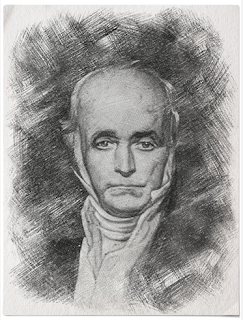In the previous posting on
this subject we began addressing a series of questions and comments,
nine in all from a faithful reader. As
we covered the material in depth in previous postings, we answered them with
brief clarifications. Most of the issues
seemed to be semantic, so we only needed to give brief responses. We covered the first five in the previous
posting, and get to the remaining four today:
 |
| Fourier: heir of Jesus and Sir Isaac Newton |
6.
I do not agree with what you said here: “The problem is that sometimes the
institutional environment is badly structured.”
It is always badly structured. The question is a degree of how badly
designed it is. There will never be a perfect world on this Earth. Our world is
always more or less badly structured. We should strive to make it more justly
structured but let’s be crystal clear that this will never attain perfection.
Therefore “full access to the opportunity and means to become virtuous” is also
unattainable.
Granted. This is a
semantic issue. Even in the best of times the institutional environment
is imperfect and will always be so. Nor will any human being (other than
in Christian belief, Jesus) ever be perfect.
God is infinitely perfect, while human beings are infinitely perfectible
— an important distinction.
The socialist idea of
establishing “the Kingdom of God on Earth” is a complete fantasy. We
probably need to make it clearer that we are speaking in purely human terms
here. In human terms, a well-structured institutional environment is possible,
even though it can never be perfect. Still, we say it is well-structured,
while one in which injustice has become intolerable is badly structured.
A good man and a well-built house are never perfect, but we would not call them
bad men or badly built houses on that account.
 |
| Virtue under totalitarianism. |
7.
But it is not necessarily a problem. It seems to me that, above all, else
people develop virtues by overcoming obstacles. Karol Wojtyla [Pope John Paul II] became
virtuous by opposing totalitarian regimes with his intellect and will power.
There are countless examples of people who developed virtues living lives of
serfs or factory workers.
Yes. That’s why we
usually add that ordinarily the way to become virtuous is to exercise
individual virtue in a well-structured society . . . which does not preclude
becoming virtuous in a badly structured society, obviously. Our goal is a
society in which virtue is the optimal choice, making the struggle to become
virtuous less onerous, even though it will never be easy.
8.
I have a hard time accepting your underlining (in many posts) that someone
without property is actually a slave in everything but a name. It is hard to
reconcile this with the lives of people like St. Maximilian Kolbe who achieved
highlights of perfection in virtues as a Franciscan monk (therefore without
property) and finally deprived of right to liberty and life in a concentration
camp. On the other hand I see people abundant in capital which seems the very
reason they do not develop natural virtues.
The idea that a free person
without private property in capital is a “masterless slave” comes from
Aristotle. As far as he was concerned, a free man without capital
ownership was actually worse off than a slave.
A slave at least “shared the life” of his or her master by being an
owned thing, while a propertyless free man neither owned, nor was owned. He was nothing — as far as Aristotle was
concerned.
 |
| William Cobbett |
William Cobbett said the same thing: “Freedom
is not an empty sound; it is not an abstract idea; it is not a thing that
nobody can feel. It means, — and it means nothing else, — the full and quiet
enjoyment of your own property. If you have not this, if this be not well
secured to you, you may call yourself what you will, but you are a slave.”
(A History of the Protestant Reformation in England and Ireland,
1827, §456.)
We don’t go quite that
far, but anyone without capital ownership is highly likely to be a dependent on
other people or the State. It is, of course, possible to become virtuous
without ownership, but it is much harder unless (as people in religious orders
do) their poverty is purely voluntary. When Jesus said to the rich young
man to give away his wealth, it was a counsel of perfection, not a mandate on
how to be virtuous in ordinary ways.
9.
Your post on banking school vs currency school is just brilliant. I do not know
whether I agree with everything you said. What I know is that I have to
seriously rebuild my understanding of monetary economics. Thank you very
very much. https://just3rdway.blogspot.com/2010/09/says-law-of-markets-part-vii-banking.html
The shift from the currency
to the banking principle is very difficult. We’re still working on
understanding all the implications ourselves.
#30#
